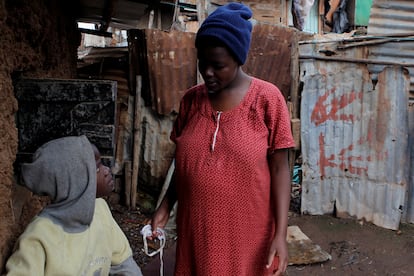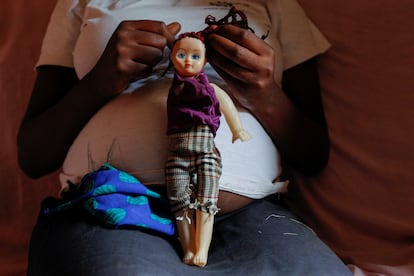Fatal abortion in sub-Saharan Africa: ‘She dilated my cervix with a cassava root and the fetus fell out’
A study by Doctors Without Borders and others warns of the proliferation of complications suffered by women following a terminated pregnancy in conflict-affected regions


“I arrived at a hospital in Bangui and a 25-year-old woman had just died in my colleagues’ arms from complications following an abortion,” says Estelle Pasquier, a researcher with Doctors Without Borders (MSF). “This can happen several times a month, but it is a preventable death with the right measures. The doctors there have their hands tied by legal and social impediments, but the vast majority consider that the healthcare in these circumstances is a right for all women because they see the damage wreaked on a daily basis when that right is ignored.” What Pasquier is describing prompted a pioneering study, of which she is co-author, on the complications suffered by women after abortion in particularly volatile regions of sub-Saharan Africa, a corner of the world where 70% of deaths related in some way to maternity occur.
According to the UN, 800 women die every day on account of pregnancy and childbirth related issues. Complications during an abortion are among the five leading causes of such deaths, but paradoxically it is only in the area of abortion where these deaths could be avoided almost 100%.
The study conducted by MSF, Epicentre (MSF’s medical research center), the Guttmacher Institute and the NGO Ipas, in collaboration with Nigeria and the Central African Republic’s Ministries of Health, focused on a hospital in the capital of the Central African Republic, Bangui, and another in Jigawa State in northern Nigeria. It was clear that serious complications following abortion in these hospitals located in impoverished, volatile and conflict-affected environments were five to seven times more frequent than in African hospitals in more stable environments studied by the World Health Organization (WHO) using similar methodology.
“Up to seven times more complications!” Pasquier tells EL PAÍS. “We knew that the problem was significant and that there was a lack of data on it due to it being a reality that is often hidden from view, but this result surprised us and convinced us that something must be done. These are places where women die from complications that are perfectly manageable and preventable.”
An X-ray of this disastrous, complex situation goes beyond the purely medical, and involves legislation that criminalizes abortion, a society that stigmatizes those who resort to it, a lack of education, the absence of information on contraception and reproductive health, a lack of independence preventing women from taking decisions for themselves, poverty, a lack of training for health personnel, and remote circumstances placing hospitals beyond the reach of patients. All these factors exacerbate the situation, according to the study.
“I was distressed,” one patient told the authors of the study after being admitted to Bangui hospital days after trying to terminate her pregnancy at home. “Someone showed me how to insert a piece of iron into my vagina. They told me it would dilate my cervix, but it didn’t work. They also told me to boil the roots of a plant called kava with sodium carbonate and drink the mixture. After that I did not feel well. I couldn’t get out of bed. The pain was intense.”
The study, titled Abortion-related Morbidity and Mortality in Conflict-affected and fragile settings (AMoCo) relies on the testimonies of more than 1,000 women who suffered abortion-related complications between 2019 and 2021 at the two medical centers. Most of those telling stories of induced abortions explained that they had used dangerous methods to provoke them, such as inserting metal objects or root vegetables into their vaginas, as well as injections, traditional herbs and medication.
“I tried to abort by myself, but it didn’t work, so I had to go to a woman in the neighborhood,” says a 27-year-old. “She asked me for 15,000 Central African francs [$25] for the abortion, but I only had 13,000, so I gave it to her. She injected me with medicine, dilated my cervix with a cassava root, and the fetus fell out. Then I started having abdominal pains.”
The UN has set a target of reducing maternal deaths to 70 per 100,000 births by 2030. But in Bangui, this seems like an unrealistic goal. With 829 maternal deaths per 100,000 live births, the Central African Republic has one of the highest maternal death rates in the world. At the hospital in the capital where the study was conducted, admissions for abortion-related complications accounted for 20% of all pregnancy-related admissions. And in a quarter of the cases, the women were minors.
“They arrive with terrible injuries, including hemorrhages, infections, injuries to the vagina and uterus and sometimes to other organs,” Richard Ngbale, professor and obstetrician-gynecologist in Bangui, tells EL PAÍS. “As a doctor, the hardest thing is that these are often women who came asking for an abortion, and we couldn’t do anything for them for legal reasons, then they come back in that state, having done it themselves.”
Pasquier stresses that the medical personnel who participated in this study had personal experience of the problem. According to Pasquier, “When we asked them if they personally knew anyone who had died from complications resulting from abortion, most of them said yes, whereas I, for example, don’t know any woman who has died from abortion.”
Delayed action
Ngbale paints a bleak picture of a Central African society that relegates women to an invisible role. “They do not know about methods of contraception,” he says. “They have no resources of their own because they do not work and depend on others to be able to see a doctor. They live far from medical centers and, in many cases, it is the men who decide on whether the pregnancy goes ahead or not.” According to the study, only 3% of women surveyed in Jigawa State and 37% of those interviewed in Bangui said they used any contraception before becoming pregnant.

The area of Nigeria focused on by this study is a very poor region, surrounded by pockets of conflict where traditions carry a lot of weight and many women don’t go to school. The main obstacles to contraceptive use is rejection of it by husbands and family, ignorance of the chances of becoming pregnant, and religious beliefs, according to the research. Official UN figures state that, across Nigeria, the maternal mortality rate stood at 1,047 deaths per 100,000 births in 2020.
The study also highlights the long and difficult journey of these women after abortion, which exacerbates general risks to their health. Half of them took at least two days to see a doctor from the onset of the first symptoms, and some waited up to six. “Many want to keep their abortion a secret,” states the report. “When symptoms deteriorate, they often decide to return to the person who performed the abortion or to untrained people, which further increases the delay in being seen and receiving adequate treatment.”
According to Ngbale, “the priority should be to inform women of their rights and promote their general education. Then we must extend the use of contraception and finally move towards the decriminalization of abortion.”
“Where do we start?” says Pasquier. “In these fragile contexts, where women are particularly vulnerable, comprehensive care must be put in place to limit their suffering and mortality. We must invest in improving the communities’ knowledge of contraception and provide safe abortion methods and proper post-abortion care, including primary care.”
Pasquier welcomes the fact that this study — delivered several months ago to the communities concerned and to the respective ministries — has already begun to have an impact. “For example, in the dissemination of contraception by local authorities and hospitals,” she says.
Experts hope that the research will also help push forward the practical application of the Maputo Protocol — the Protocol to the African Charter on the Rights of Women in Africa, adopted in 2003 — as this should provide the legal framework for African women to claim their right to safe abortion healthcare. Most African countries have ratified it, but its implementation is long overdue in almost all.
Sign up for our weekly newsletter to get more English-language news coverage from EL PAÍS USA Edition
Tu suscripción se está usando en otro dispositivo
¿Quieres añadir otro usuario a tu suscripción?
Si continúas leyendo en este dispositivo, no se podrá leer en el otro.
FlechaTu suscripción se está usando en otro dispositivo y solo puedes acceder a EL PAÍS desde un dispositivo a la vez.
Si quieres compartir tu cuenta, cambia tu suscripción a la modalidad Premium, así podrás añadir otro usuario. Cada uno accederá con su propia cuenta de email, lo que os permitirá personalizar vuestra experiencia en EL PAÍS.
¿Tienes una suscripción de empresa? Accede aquí para contratar más cuentas.
En el caso de no saber quién está usando tu cuenta, te recomendamos cambiar tu contraseña aquí.
Si decides continuar compartiendo tu cuenta, este mensaje se mostrará en tu dispositivo y en el de la otra persona que está usando tu cuenta de forma indefinida, afectando a tu experiencia de lectura. Puedes consultar aquí los términos y condiciones de la suscripción digital.








































